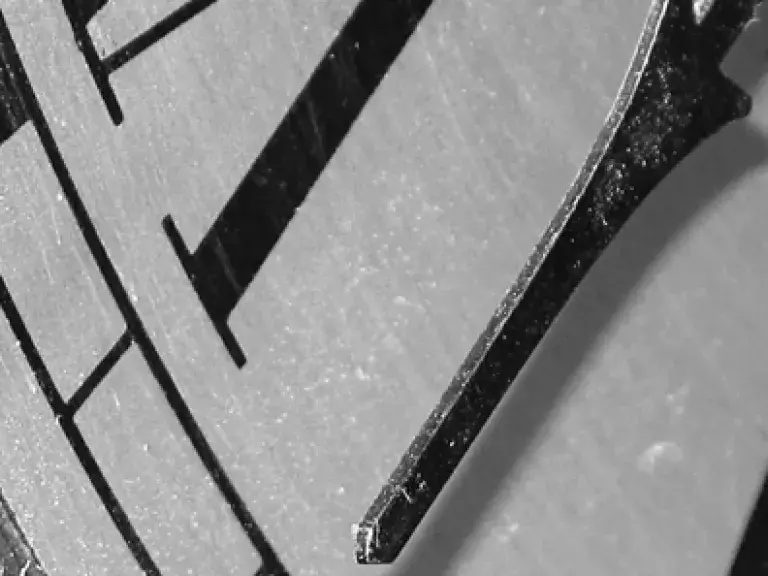
I was multitasking last week, when my attention was drawn to a radio interview with James Gleick, the author of Faster: The Acceleration of Just About Everything. He hit it right on our button, saying we are not only doing everything faster, more "efficiently," "saving" time, but that the service/entertainment industry is doing this for itself and, presumably, for us.
To take just one sector, "waste seconds" and microseconds are being shaved from television shows and commercials, trimming down film frames per sequence, double- and triple-cutting, jumping, overlapping, and interleaving images and scenes till Hell won't have it. Seen a movie preview lately?
While the implications of what Gleick says about the drive to accelerate every aspect of our waking and sleeping lives are scary, that's not the half of it. His observations tie in with other speculations about how we've been changing and how that has changed our relationship to music, our way of hearing and processing it. These changes are revolutionary and fundamental.
The technological revolution is working a profound change, not just in our music, but also in us.
Clearly, what music we listen to, how we listen, and how we create it are influenced by all the music and sound that we take in around us. Other forces are also affecting all that, however. The technological revolution is working a profound change, not just in our music, but also in us.
In his brilliant book, The Gutenberg Elegies: The Fate of Reading in an Electronic Age, Sven Birkerts describes our living now through a period of "overlap in communication modes, and the ways of living they are associated with." He compares this to the transitional epoch in ancient Greek society during Socrates' time, when the "dominant oral culture was overtaken by the writing technology," and then to the later epochal transition in the late 15th century after Gutenberg invented movable type, and now to the overlap of the printed word by the electronic media.
We now read differently, thanks to the hours spent in front of the screen, skimming, skipping, only infrequently scrolling back to reexamine a particularly interesting or elusive passage. If we are reading differently, our minds are beginning to work differently. I suspect we are beginning to listen to music differently as well.
If we agree with the late Joseph Brodsky's observation that "aesthetic choice is a highly individual matter, and aesthetic experience is always a private one," we must recognize that the electronic medium does not readily support that condition.
Birkerts maintains that "while circuit and screen are ideal conduits for certain kinds of data, they are entirely inhospitable to the more subjective materials that have always been the stuff of art. That is to say, they are antithetical to inwardness...The main reason has to do with time...The time of the self is deep time, duration time...To the extent that we immerse ourselves in a book, listen to music, sink into the visual realm of a painting, to that degree we surrender our awareness of the present as a coordinate on a grid...All circuit-driven communications, by contrast, are predicated upon instantaneousness."
And that brings us to James Gleick's Faster. As he describes the condition of a society in a rush, you recognize this compulsion in the acceleration devices at every hand. We have the modern concept of "real time," which means right now or sooner. And now, in Internet time, thought and consideration give way to immediacy of communication, the imperative instantaneousness.
Gleick's book links all the familiar patterns of compacted functioning. Obvious ones are cell-phoning and multi-tasking, which may gratify with the "saturation of parallel pathways of the brain" but also condition behavioral patterns not exactly conducive to contemplation and considered decision-making.
Music is different, and to rush or compress or abridge it is to negate its whole function.
In chapters like "The Paradox of Efficiency," "365 Ways To Save Time," and "Eat and Run" we see the reflection of a society and culture racing to the horizon. The musical public has to be affected. The art that has always assumed that listeners would devote time to 40- or 50-minute compositions and to full evening performances now faces an impatient public. There are countless examples of performing institutions caving in or catering to this hurrying restlessness of the public.
Music is different, and to rush or compress or abridge it is to negate its whole function. In pronouncing the truism that "music is the art form most clearly about time," Gleick points to the central issue but also, I believe, to the saving grace.
Music is our best hope to help us hold on to our lives, to control the pace and rhythm of it. It can yet hold us to an understanding and appreciation of time. Immersion in the time- play that is part of every great work's expressive scheme can help restore temporal perspective.
The day's rushing, the seconds or minutes "saved" suddenly lose significance when we are submerged in a great symphony. Just that separation or stepping aside may be an important motivation to attend concerts—a sanctuary where time may be held still, in suspense.
It may well be that music in its example and inspiration may restore meditation, contemplation, the time we have lost and continue to lose in the mad race to save time. Music, perhaps uniquely, has that power.
Author credit:
Robert P. Commanday
This article is adapted from The Voice, Spring 2006.

